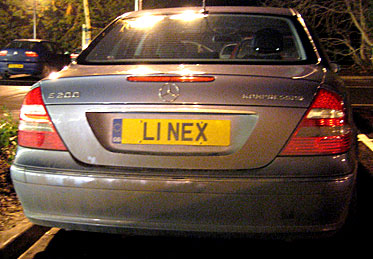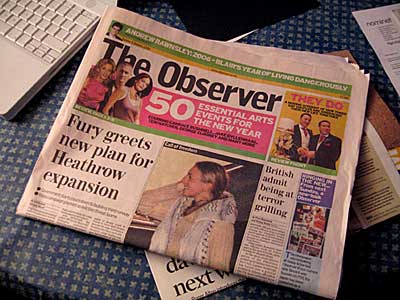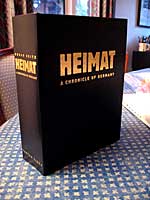The Wall Street Journal journal is reporting (from behind a paywall) that “Young people tend to drink more in areas with more alcohol advertising compared to areas with less advertising, according to a NIH-funded study”. Wow! Wish I could get funding for research like that.
Sony to settle anti-piracy CD row
According to BBC NEWS,
Free music downloads and cash refunds could soon be offered to owners of Sony BMG CDs loaded with controversial anti-piracy software.
The offers are part of a proposed settlement of lawsuits against Sony BMG over the use of software aimed at thwarting illegal copying of CDs.
Almost word perfect

Ah, for the want of a ‘u’! Seen in a car park today.
Tyranny and normality
I’ve been watching Heimat over the Christmas break, and finding it even better than I remembered. For those unfamiliar with it, Heimat is an eleven-part fictional account of life in a small German village during the rise of the Nazis and afterwards.
On paper, it must seem very dull. The characters are not in the least flamboyant — it’s very much a story about ‘ordinary’ folk; and nothing much happens — except that the Nazification of life and the annexation of the state for ideological purposes gradually seeps into every crevice of daily living. There are few real villains, and only the quietest of heroes (or, more accurately, heroines — the central women characters come out of it well.) People who were weak and/or nasty before the rise of Hitler become exploiters of, or slaves to, the new ideology; while those who were always strong or balanced tend to retain their judgement and common sense — even if they sometimes have to rein in their tongues.
And it also communicates vividly how convincing prosperity is to the average citizen — especially if s/he has previously experienced economic hardship (as most German citizens did in the 1920s.) It’s as if prosperity dissolves doubt and uncertainty. (We saw a lot of that in booming Ireland a few weeks ago, as people thronged shops in a frantic Christmas spending splurge.) Heimat captures very well the growing public acceptance of the regime as economic conditions improve, shopkeepers’ turnover increases and people are able to buy cars and consumer goods. (One memorable episode is entitled “The Best Christmas Ever”, and chronicles the quiet satisfaction the villagers felt as 1935 turned into 1936.)
The series is a masterful evocation of the steady perversion of a civic culture. It is also an antidote to complacency: I myself come from a rural background, and could imagine many of the same things happening in the communities in which I was reared. So I was very struck by this quote from Richard Evans’s new book, The Third Reich in Power.
‘The further in time we get from Nazi Germany, the more difficult it becomes for historians living in democratic political systems … to make the leap of imagination necessary to understand people’s behaviour in a state such as Nazi Germany.’
The significance of Heimat as a creative work is that it makes that ‘leap of imagination’ possible.
What is it with the Wikipedia?
Quentin had a link to some thoughtful musing by Bill Thompson about the current Wikipedia controversies. His conclusion:
I use the Wikipedia a lot. It’s a good starting point for serious research, but I’d never accept something that I read there without checking. If the fuss over Siegenthaler, Stoltenberg and Curry means that other readers do the same then it will have been worthwhile. We shouldn’t dismiss the Wikipedia, but we shouldn’t venerate it either.
Last chance to see…

The Observer, the newspaper I’ve written for since 1972, has been published in broadsheet format ever since it was founded in 1791. But today’s is the last broadsheet edition. From next Sunday it will be published in the Berliner format of its sister paper, the Guardian. The change was inevitable, but it’s the end of an era all the same.
So what did I get for Xmas?

A Global utility knife, IMHO the best in the world. It’s Japanese, beautifully made and perfectly balanced. And sooo sharp. I’m the cook in our household, so this is a working tool, not a toy.

A pair of Grado SR-60 open-back headphones. I know, they look like something that Soviet radio operators used to wear, but they’re exceedingly comfortable and provide wonderful, rich audio.

The DVD set of Heimat 1, Edgar Reitz’s stunning saga of life in rural Germany between the First and Second World Wars. I was a TV critic for 13 years, and when I quit in 1995 an interviewer asked me what I would remember most from my stint. I had no hesitation in responding “Two things: Reitz’s Heimat and Dennis Potter’s The Singing Detective“.

But by far the best presents I got were some mince pies specially baked by my daughter for me on Christmas Day with the letters of “Happy Xmas” cut out in pastry and presented in a hand-made box.
Boomtown Rat leaves sinking ship?
‘Sir’ Bob Geldof has accepted a role as poverty consultant to the new Compassionate Conservative (TM) Tory Party. Naturally he denies that he is deserting New Labour. After all, he was never a member so how could he defect? But it’s one more straw in the wind. Geldof & Co can spot a change in the wind a hundred miles away. Now all I’m waiting for is for Richard Branson to discover the attractions of the Cameroonies. Remember the way he showed up at the Labour victory celebrations in May 1997 after a decade of paying sycophantic attention to the Tories?
Honour goes to Apple gadget guru
The ludicrous UK ‘gong’ system has given a piddling ‘honour’ to Jonathan Ive, the designer behind Apple’s iPod and iMac. He’s become a Commander of the British Empire (CBE) in the New Year Honours list. Er, what empire is that, exactly?
Useful words # 2655
“Paradoxophile”.
Used by Frank Kermode to describe Adam Phillips, the soi-disant expert on flirtation, Freud and other fashionable topics, in the London Review of Books, 19 June, 2003.
